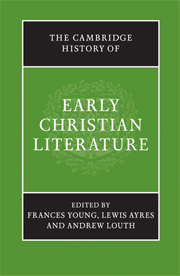Book contents
- Frontmatter
- PART ONE The Beginnings: The New Testament to Irenaeus
- A LITERARY GUIDE
- 1 Introduction: the literary culture of the earliest christianity
- 2 The apostolic and sub-apostolic writings: the New Testament and the Apostolic Fathers
- 3 Gnostic literature
- 4 Apocryphal writings and Acts of the martyrs
- 5 The Apologists
- 6 Irenaeus of Lyon
- B CONTEXT AND INTERPRETATION
- PART TWO THE THIRD CENTURY
- PART THREE FOUNDATION OF A NEW CULTURE: FROM DIOCLETIAN TO CYRIL
- Bibliographies
- Index
- Map: The Roman Empire in the late fourth century AD"
- References
2 - The apostolic and sub-apostolic writings: the New Testament and the Apostolic Fathers
from A - LITERARY GUIDE
Published online by Cambridge University Press: 28 March 2008
- Frontmatter
- PART ONE The Beginnings: The New Testament to Irenaeus
- A LITERARY GUIDE
- 1 Introduction: the literary culture of the earliest christianity
- 2 The apostolic and sub-apostolic writings: the New Testament and the Apostolic Fathers
- 3 Gnostic literature
- 4 Apocryphal writings and Acts of the martyrs
- 5 The Apologists
- 6 Irenaeus of Lyon
- B CONTEXT AND INTERPRETATION
- PART TWO THE THIRD CENTURY
- PART THREE FOUNDATION OF A NEW CULTURE: FROM DIOCLETIAN TO CYRIL
- Bibliographies
- Index
- Map: The Roman Empire in the late fourth century AD"
- References
Summary
The expression ‘Apostolic Fathers’ corresponds to an idea of seventeenth-century origin. It originated as the label for a set of writings, then in the process of being recovered and edited, whose authors, though mere ‘fathers’ and not apostles, were taken to have been close to figures of the apostolic age and thus to possess a certain tincture of apostolic authority. Their writings were therefore both associated and contrasted with those contained in the New Testament, since the latter were assumed to have been written either by apostles proper or by first-generation contemporaries and disciples of theirs.
Historical-critical study of the New Testament has since eliminated the chronological gap that this scheme postulates between the New Testament and the Apostolic Fathers. It is now recognized that apart from the genuine letters of Paul, the books of the New Testament were all written in the period between (roughly) AD 70 and 140, and are thus largely contemporary with those contained in the collection of Apostolic Fathers (–and also, of course, with certain ‘apocrypha’ and gnostic writings). What distinguishes the latter collection, then, is simply the fact that its writings are relatively primitive, that they belong to traditions counted orthodox, and that they did not become part of the New Testament (though at least three of them – I Clement, The Shepherd of Hermas and Didache – appeared on certain lists of New Testament books).
Keywords
- Type
- Chapter
- Information
- The Cambridge History of Early Christian Literature , pp. 11 - 19Publisher: Cambridge University PressPrint publication year: 2004

